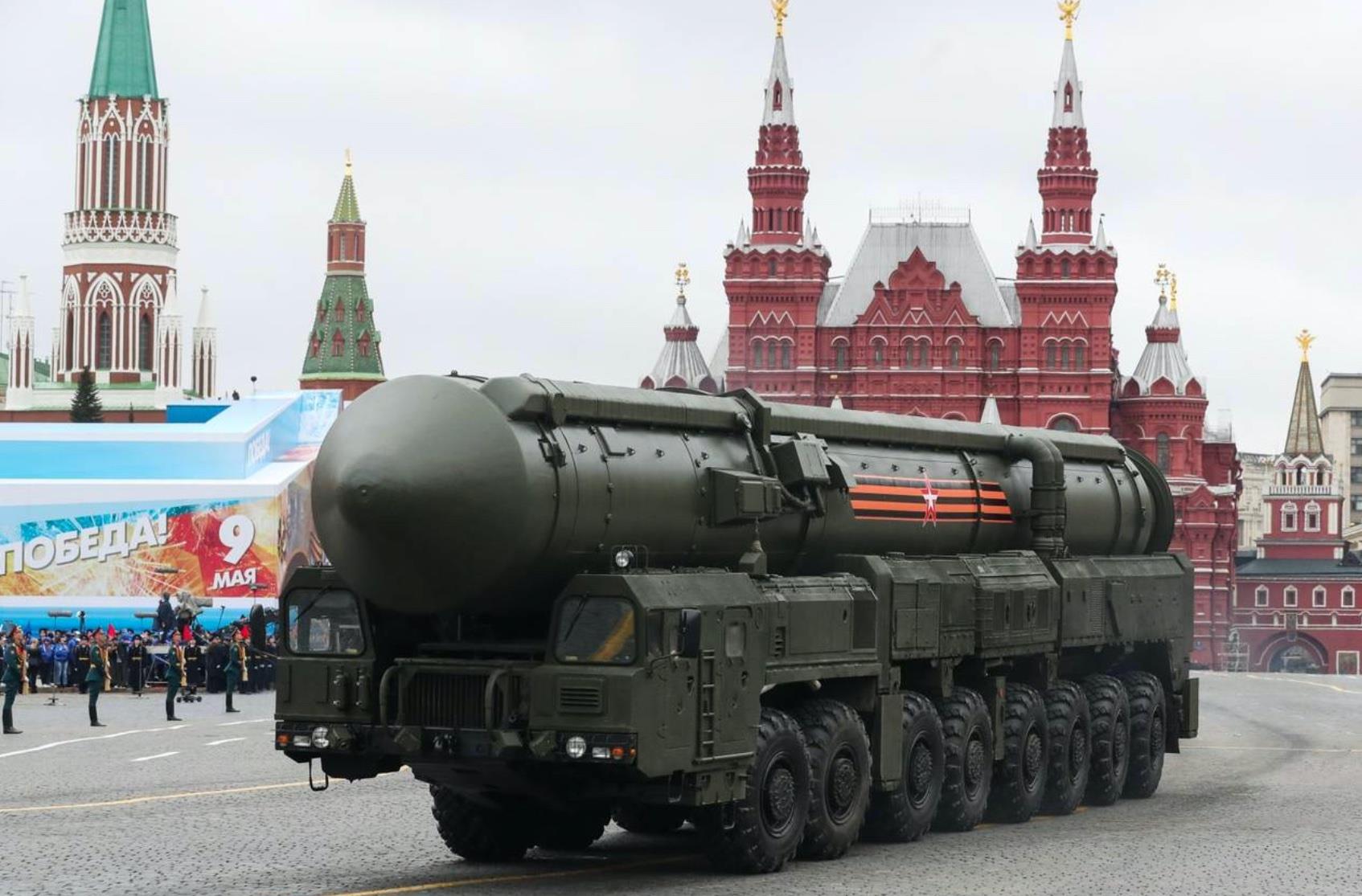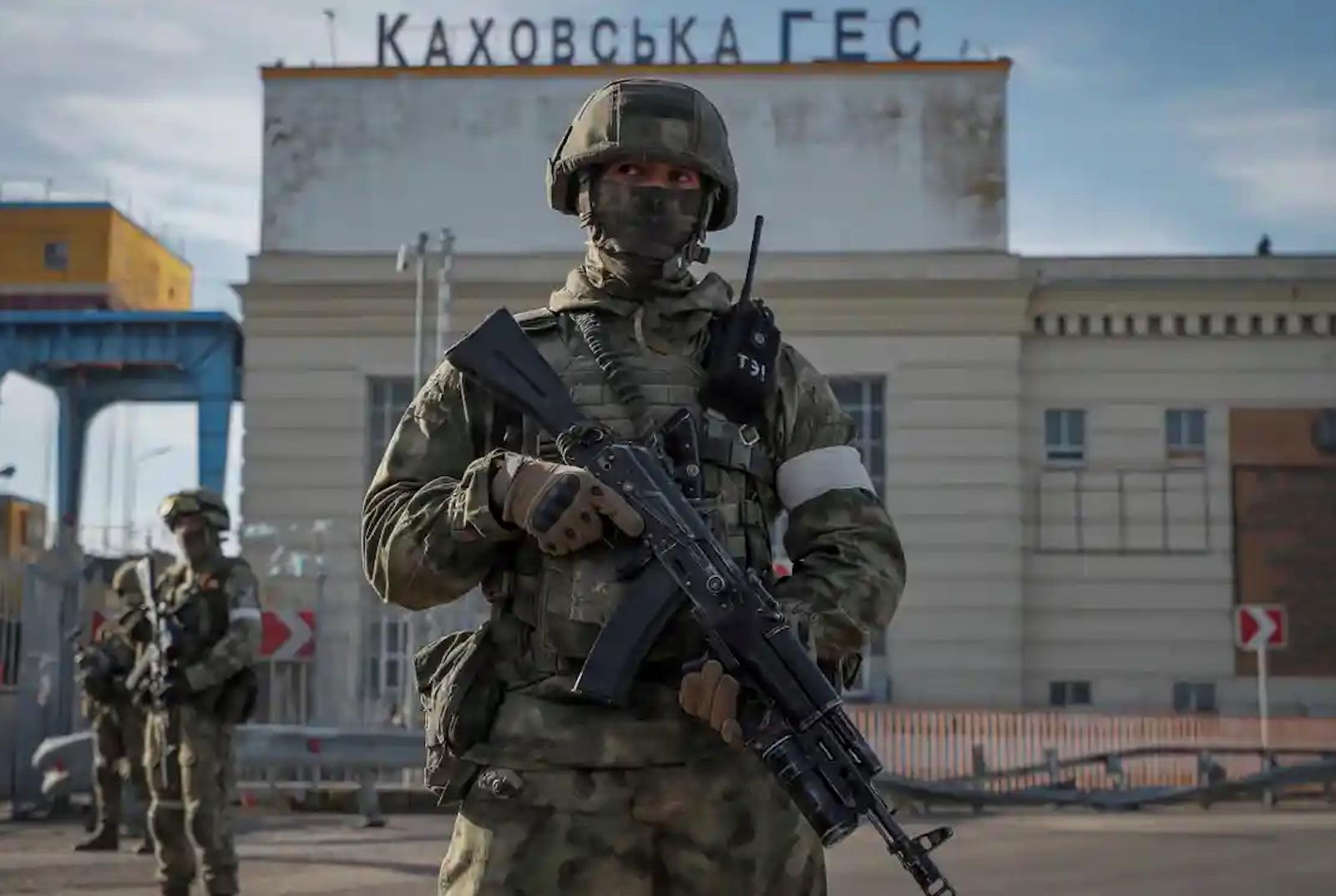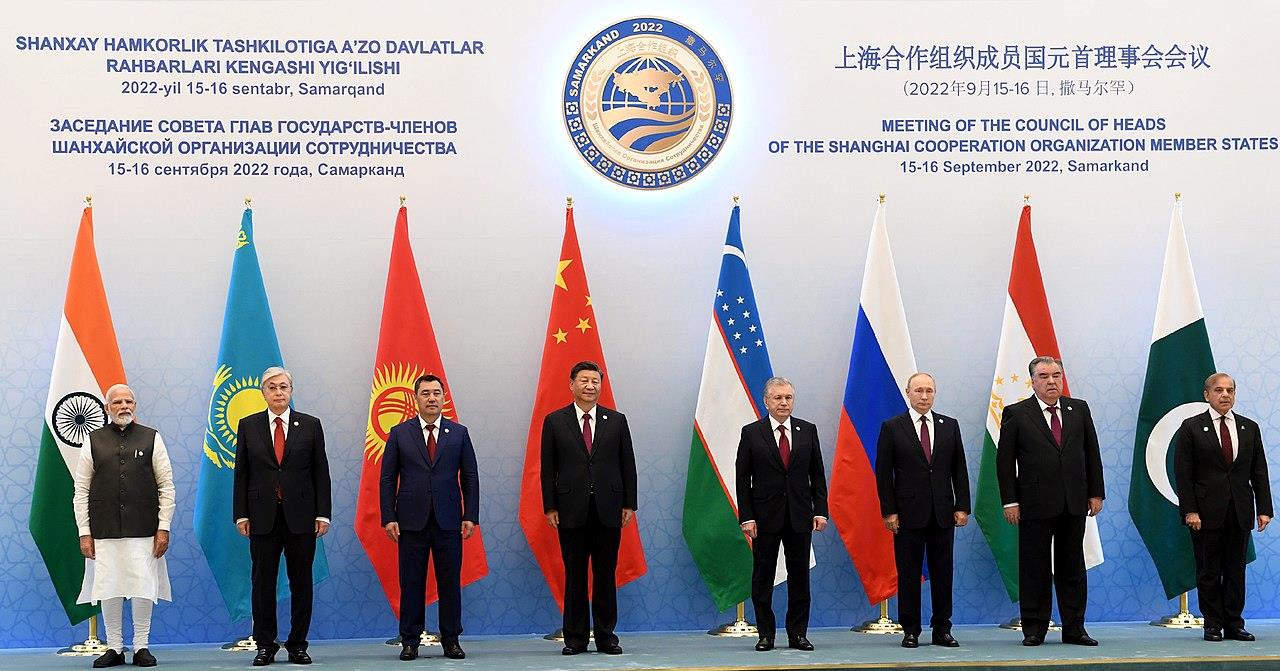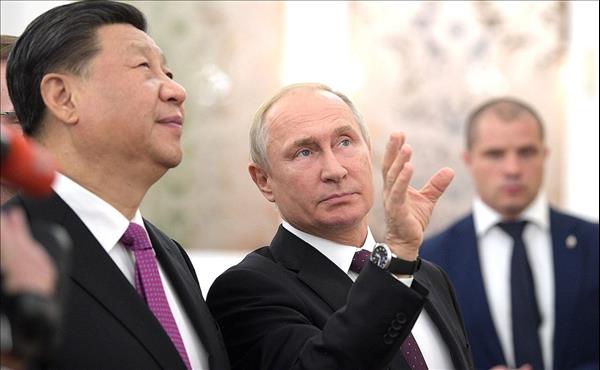
Putin's War Speech Contains Outlines Of A New World
Russia's annexation of southern and eastern Ukraine is political theater with elements of farce. President Vladimir Putin has conquered none of the oblasts (provinces) that he claims have joined Russia. Nor could he hold them.
Only hours after he announced new annexations, Ukraine's army dramatically embarrassed Putin, pushing his forces back from the strategically crucial city of Lyman in Donetsk Oblast. The war continues, with no clear end in view.
Putin's rhetoric is often hyperbolic, mixing political and theological messages. It strikes many in the West as preposterous, and so receives only limited attention. But Putin sees Russia as having embarked on a Great Crusade.
Despite the religious language and imagery he uses, he hopes and expects the Communist leaders of the People's Republic of China to ally with him in this Crusade.
The West has good reasons to worry about Russia's nuclear threats, but even if all such threats were set aside, the West should recognize that Russia's ambitions are a grand, serious and strategic effort to exploit current Western weakness.
Madman?Many Western commentators have analyzed Putin's nuclear comments, speculating that he is somehow psychologically or mentally unbalanced, and will therefore employ nuclear weapons.
Yet Russia has made nuclear threats for a precise reason, to prevent NATO intervention. Russian nuclear doctrine includes active provisions for nuclear use, but only when, as Putin and his team have taken pains to emphasize, the Russian state and Russian territory are at risk.
Russian territory is not actually at risk. Ukraine has struck targets in Crimea multiple times, most notably destroying Saki Air Base in August, and more recently sabotaging or destroying an airfield. Ukrainian helicopters also attacked Belgorod in a daring cross-border raid earlier in the war.
Indeed, in the war's first days, Ukraine attacked Millerovo Air Base in Rostov Oblast. In no case did these attacks on Russian“territory,” whether internationally non-recognized Crimea or Russia“proper,” prompt a severe Russian response.
Nuclear use would not change the war's battlefield dynamics – Ukraine has distributed its forces carefully to decrease the damage of a tactical nuclear strike. A detonation on recently annexed territory would be bizarre: Even Putin would struggle to rationalize using nuclear weapons on recently claimed Russian soil.
Attacking Kiev or another population center would be far more damaging, but it would not break Ukrainian will. Demonstrative use would have similarly little impact.

An intercontinental ballistic missile at a military parade in Moscow, May 9, 2017. Photo: TASS / Valery Sharifulin
Russia has not conducted a variety of lower-level escalatory strikes to settle the conflict, namely critical infrastructure strikes or the much-speculated destruction of the Zaporizhzhia nuclear reactor.
And there is scant evidence that Russia is actively preparing for a nuclear strike, or placing its nuclear forces on high alert, a necessary step after low-level use in case of major Western retaliation.
Putin and other Russian leaders have phrased nuclear threats with care. They have not once threatened Ukraine itself with nuclear use. In each case the threatened target is the West: If the West threatens Russian territorial integrity and the survival of the Russian state, then nuclear use is likely. The point is to preserve the limited nature of the limited war.
The North Atlantic Treaty Organization accommodates Russia by refraining from active intervention, despite the alliance's interest in defeating Russia and weakening it militarily. Russia refrains from physically attacking the flow of NATO supplies to Ukraine, though they are a key to Ukraine's military successes.
In his most recent speech, Putin said Russia would defend its territory by all necessary means. He did not explicitly mention nuclear weapons. Most ominous was his remark that America's destruction of Hiroshima and Nagasaki with nuclear weapons in August 1945“set a precedent.”
The US used such weapons on the battlefield in Japan to terminate the fighting in the Pacific theater in World War II. So Putin may be implying that Russia will adopt a similar policy in Ukraine.
In his speech last week, Putin claimed that the Hiroshima and Nagasaki bombings, along with American strategic bombing of Germany and Japan generally, were“without military necessity,” were done for purposes of intimidation.
Putin's argument here is not just about nuclear threats; it's part of a broader case he is making against the role of the West in world history. Putin is promoting a grievance narrative that deserves greater attention.
Challenging Western dominancePutin is resurrecting themes he first promoted many years ago. In 2007 in Munich, for example, he denounced Western powers for violating international law and argued that those states beyond the West's liberal democratic understanding of legitimacy must act in response.
His recent annexation speech, however, relies on blood-and-soil nationalism to justify Russia's absorption of Ukrainian territory – in other words, to deny that Ukraine has a right to exist as an independent country. Kherson, Zaporozhzhia, Donetsk and Luhansk are Russian.
Putin's sham referenda are not directed toward the West. He knows the show-votes will gain little traction in the West. The referenda are for the benefit of Putin's Russian supporters who are nostalgic, as he is, for the days of Soviet glory.
Ukrainians forced to vote at gunpoint to become Russians made, as Putin sees it, a choice to affirm their true identity, just as the Balts did in 1940 through Soviet-managed People's Assemblies. If Westerners reject the referenda, then to hell with the Westerners and their international order.

Russian soldiers stand guard at the Kakhovka power plant near Kherson. Photo: Twitter / EPA
Saying“to hell with the West” is essential to Putin's leadership: the justification for his rule, the common interest he has with China and other lesser world powers such as Iran, and the resentment that he hopes will fuel the development of a new set of international relationships that will challenge the dominance of the West.
Much is made of the bizarre nature of Putin's fixation on homosexual relationships and supposed Western degeneracy. It makes far more sense when one identifies liberal democratic principles with the depravity of Western civilization, as Putin does explicitly.
Russia, as he puts it, accepts different ways of life and has no desire to impose cultural hegemony on others. In contrast, he argues, the West corrupts, transforms, and seeks to destroy ways of life that differ from its own. So the West is inherently an enemy to Slavic-Russian, Islamic and Asian cultures, countries and peoples.
Russia defends traditional values and upholds the standard of true democracy, as defined in the Sino-Russian joint memorandum, a view that respects different power centers, not simply the domestic majority will.
Sino-Russian ententePutin has made only two dramatic moves this year, one between February 20 and 24, when Russia invaded Ukraine, and one between September 21 and 30, when Russia began to mobilize and annexed partly conquered eastern and southern Ukraine. Each action occurred only after consultation with China.
The Russian invasion was delayed until after Xi Jinping green-lighted it: Putin allowed Xi to complete his Olympic display and invaded days after it ended.
Xi approved the invasion not because he thought Putin's ambitions were restrained, but because he hoped for and expected a smashing Russian victory to place it in a far stronger geopolitical position, uniting Ukraine, Russia and Belarus into an autarkic bloc that could confront the Euro-Atlantic coalition, divide its attention and perhaps break it.
Xi has no desire to see Putin humbled. There is evidence that China still provides Russia with critical technologies, judging by the most recent round of sanctions against Chinese companies just discovered to have violated US export restrictions.
China has never rebuked Putin for the invasion. Indeed, its most recent calls for mediation match Putin's apparent peace offer to Kiev in his annexation speech – surrender is a form of peaceable settlement, albeit one with neither prudence nor honor – and its military continues to exercise alongside Russia's.
It is entirely logical to expect Xi and Putin, before and during the recent Shanghai Cooperation Organization (SCO) Summit, to have discussed Russia's mobilization, nuclear saber-rattling, and annexations.

Heads of states and governments of the member states at the 2022 SCO summit in Samarkand, Uzbekistan. Photo: Wikipedia
It is therefore significant that Putin's recent speech identifies Russia's struggle with China's. China is mentioned by name twice – for the only time in any of Putin's“war speeches” – first in the context of the Opium Wars, second alongside Iran, the other potential member of an authoritarian entente.
Putin also subtly identifies China's oppression with Russia's, equating“centuries of Russophobia” with the Chinese Century of Humiliation. In turn, Putin embraces anti-colonialism, equating the USSR explicitly with the Russian Federation, and advocating that Russia continue the Soviet mission of world revolution.
This is not to say that Putin has suddenly embraced Marxist-Leninism. It does indicate a clear rhetorical shift, one that employs some of the most consistent intellectual precepts of his literally communist ally in Beijing.
What's really at stakeGiven this rhetorical and political context, Putin's geo-economic emphasis should be far more disturbing to the West.
His speech builds to a thorough denunciation of the international financial system –“people cannot be fed with dollars and euros” – beginning with his jealousy of Western financial dominance – the US imposed“the power of the dollar as the global reserve currency.”
Sino-Russian trade is at record levels, Sino-Russian satellite systems are increasingly interlinked, Sino-Russian communications are robust and consistent. China, meanwhile, explicitly directed its banks to prepare to dump dollars, ostensibly to strengthen the renminbi before the 20th Party Congress. The SCO agreed during its September summit to increase“national currencies” in intra-bloc trade – that is, to initiate the de-dollarization process.
It is noteworthy that India and China, along with Brazil, abstained from the UN Security Council vote condemning Russia's annexation. The notion that the BRIC countries (Brazil, Russia, India and China) may become the core of a new global economic system that can compete with the system dominated by the Euro-Atlantic bloc is flattering for some people in those countries, though it looks far less realistic now than it did some years ago when the term“BRIC” was coined.
The most likely means of achieving this parallel system are either explicit Chinese support for Ukraine and subsequent secondary sanctions, which would occur after the 20th Party Congress, or more alarming, a Chinese invasion of Taiwan.
Putin's speech had a variety of target audiences. Foremost among them was the Third World. Africa and Latin America have been directed to prepare. Decoupling and global economic cataclysm are not far-fetched.
It is this, rather than the prospect of nuclear use, that should concern the West and motivate it to bring the Ukraine war to a rapid conclusion by assisting Ukraine in humbling Russian power.
The struggle for Eurasian mastery has just begun. Ukraine is its beginning, not its end.

Legal Disclaimer:
MENAFN provides the
information “as is” without warranty of any kind. We do not accept
any responsibility or liability for the accuracy, content, images,
videos, licenses, completeness, legality, or reliability of the information
contained in this article. If you have any complaints or copyright
issues related to this article, kindly contact the provider above.

















Comments
No comment